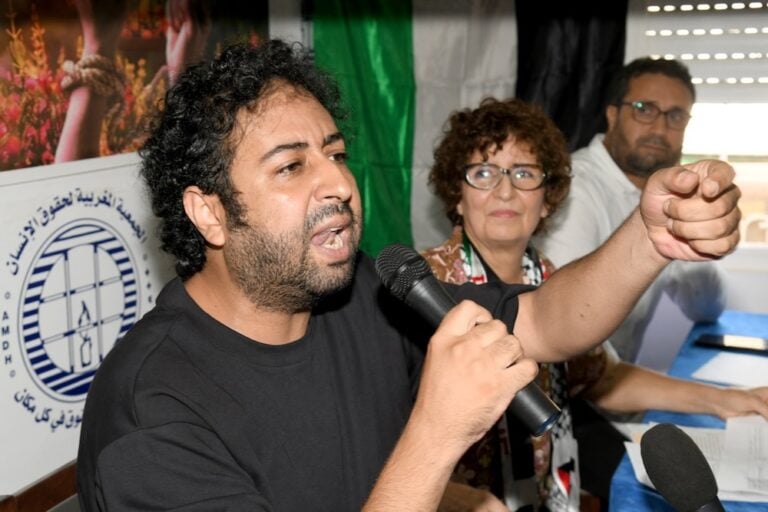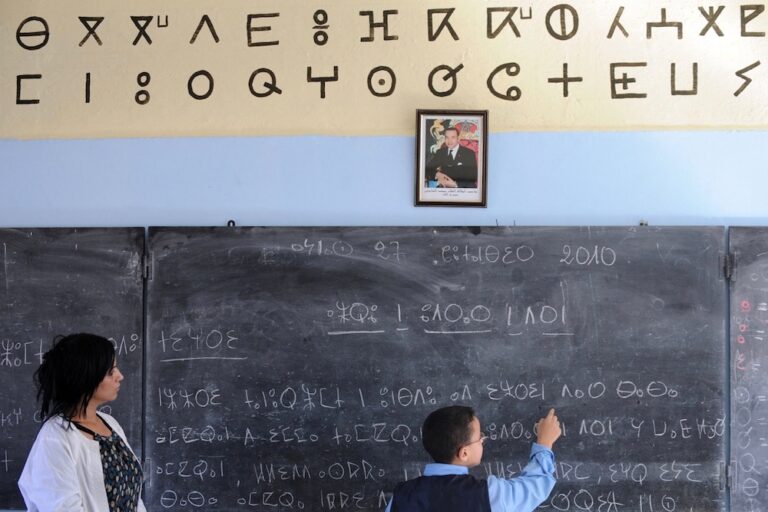(RSF/IFEX) – On 16 April 2003, RSF said it would send a fact-finding mission to Morocco during the week of 21 April to investigate growing media repression in the country. Ali Lmrabet, publisher of the weeklies “Demain Magazine” and “Douman” and the organisation’s correspondent in Morocco, has been the target of repeated legal harassment since […]
(RSF/IFEX) – On 16 April 2003, RSF said it would send a fact-finding mission to Morocco during the week of 21 April to investigate growing media repression in the country. Ali Lmrabet, publisher of the weeklies “Demain Magazine” and “Douman” and the organisation’s correspondent in Morocco, has been the target of repeated legal harassment since he published articles and cartoons criticising the royal household and government policy.
“The authorities have increased their pressure on the independent media in recent weeks, with threats, harassment, summonses and legal action,” noted RSF Secretary-General Robert Ménard. “The government has used the international focus on Iraq to return to its old repressive ways, and several journalists, including Lmrabet, have been the victims. We are very concerned,” Ménard added.
Lmrabet was called in by police detectives on 1 April on the orders of a Rabat state prosecutor. He was interrogated for five hours about articles he had published in recent months. These have included reports on the king’s civil list budget (an official Finance Ministry document distributed to members of parliament for approval), a cartoon about “the history of slavery” and a photo-montage featuring various politicians.
Police asked Lmrabet if he was aware that he had called into question the “sanctity” of the country’s institutions. He was also questioned about excerpts from an interview (which first appeared in the Spanish daily “Avui”) with an anti-royalist Moroccan figure, Abdallah Zaâzaâ, who called for the self-determination of the Saharawi people. The journalist was accused of “undermining the territorial integrity” of Morocco.
Lmrabet told RSF he was quite surprised to be accused of these offences because the author of the remarks had not been troubled and it was not the first time such statements had been reported in the Moroccan media.
On 9 April, he was summoned again by police in Rabat and a Casablanca court at virtually the same time, though the two cities are 100 kilometres apart. He kept the appointment in Casablanca, where six complaints filed against him by journalists from the daily newspaper “El Ahdath el Maghribia” were heard.
Forty “El Ahdath el Maghribia” journalists have filed a total of 40 complaints against Lmrabet so far in 2003, because of a cartoon in “Demain Magazine”‘s 11 May 2002 issue, in which their newspaper was described as “pornographic”. The plaintiffs deliberately filed their complaints in different cities, forcing Lmrabet to report to at least half a dozen courts between 28 January and 5 June 2003. “He has to be everywhere at once, but he cannot be convicted more than once for the same offence,” his lawyer, Ahmed Benjelloun, explained.
Lmrabet, who said the whole matter is “clearly political,” was summoned again on 10 April by police in Rabat on the orders of the state prosecutor. He was asked the same questions as earlier by two officers. “Your answers are not good enough,” one officer said. When Lmrabet asked him to write the remark in the official report on the questioning, the officer refused.
Also on 10 April, in Settat (80 kilometres south of Casablanca), Mohamed Bennouna Louridi, who writes for “Douman”, was physically assaulted in the street by several people who accused him of writing an article about the town’s governor that appeared on 9 April.


